Citrus Workers Focus on Eye Safety
August 2007

Cesar Santes Valencia picks a Valencia orange. The oranges are sent to juice factories.
The May midday sun in southern Florida is intense as Cesar Santes Valencia reaches into an orange tree to pull down the fruit that share his name — Valencias, which will go to a local juice factory. As he picks, the migrant worker from Vera Cruz, Mexico, leans head-first from his ladder and picks rapidly from a tangle of branches. Protecting his eyes during this hazardous maneuver is a pair of safety glasses, held tight with a head strap.
Eye injuries are among the most common injuries affecting citrus workers, but only a few wear protective glasses. Researchers at the University of South Florida’s Prevention Research Center (PRC) would like to see that change.
The PRC, with funding from the Centers for Disease Control and Prevention, has been training citrus workers in central Florida, including Mr. Santes, to be health promoters. Promoters teach coworkers about eye safety and perform eyewashes in the groves if someone gets debris in his or her eye. During the past 4 years, the PRC has trained about three dozen promoters, and through them, more than 1,000 citrus workers. Workers trained by the promoters are almost 3 times more likely to wear safety glasses than workers who received no training.
"One guy last week had debris from branches in his eye, and I had to wash
out his eye twice in the field," the Spanish-speaking Mr. Santes said
through an interpreter. "The guy wasn’t wearing glasses, so I took the
opportunity to tell him to wear them."
The U.S. Bureau of Labor Statistics reports that eye injuries in
agricultural workers can be caused by exposure to chemicals, dust, plant
materials, and sunlight. During the last decade, agricultural workers across
the country have suffered 1,700 to 3,000 eye injuries per year, costing
agricultural companies and workers $300 million in medical expenses and lost
work time. Safety glasses are estimated to prevent 90% of eye injuries,
which can cause pain, swelling, or eye loss.
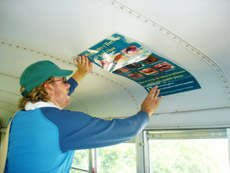
Jason Lind, a member of the University of South Florida Prevention Research Center’s research team, fastens a poster showing common eye injuries to the ceiling of the bus that an orange picking crew rides to work each day.
Paul Monaghan, PhD, project director for the PRC’s Partnership for Citrus Worker Health, said the training curriculum for the health promoters focuses on three areas, "We teach them, injuries are serious, injuries are preventable, and how to treat injuries."
Workers who are chosen as promoters meet every week for first aid training, and later, to debrief with researchers from the university about how their teaching is going. The PRC pays each promoter $50 a week during the season for their work. PRC researchers adapted the training from one used by universities in Illinois and Florida with agricultural workers in the midwest. The curriculum was modified specifically for Latino migrant workers picking oranges.
"The whole migrant worker population gets so little attention from researchers, and there’s a need," Monaghan said.
One reason research has been scarce may be that migrant workers are mobile, which makes tracking their progress difficult. Citrus workers in Florida are mostly from Mexico but are a mix of Spanish-speakers and Indians who speak Mayan languages, so language can also be an obstacle for researchers.
"Workers are often young men away from their families, and more than half live below the poverty line. Helping them stay safe is in everyone’s best interest," Dr. Monaghan said. "These people are important. Citrus is a $9 billion industry in this state. These guys are important to the economy, their employers, and their families back home."
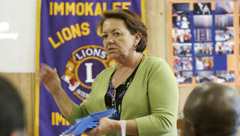
Nancy Frees, director of the local health department, is a member of the Community Advisory Council that helps implement the eye safety project. She uses meetings as an opportunity to educate community members about other health hazards that migrant workers face.
Industry officials who work with the program say it has been useful. This
year, the researchers are working with crews of citrus workers from Southern
Gardens (a subsidiary of U.S. Sugar) and Evans Properties. Citrus company
managers hand out protective gear such as safety glasses and gloves at the
start of each season, but they have trouble getting workers to wear the
eyewear, said A.J. Lozano, a harvest manager for Southern Gardens.
Mr. Lozano’s company was happy to work with the researchers. "It’s on our
priority list to keep employees safe," Mr. Lozano said. Southern Gardens
gives workers incentives to wear the glasses — a $20 phone card for everyone
on a crew if no eye injuries occur in that crew in a given period. Even so,
not all the workers wear the glasses, and not all the time while picking.
The PRC researchers and partners conducted surveys to find out why workers did not wear glasses. Reasons were plentiful. Some people find them uncomfortable. In the hot sun, sweat around the eyes can make the glasses slippery or cause lenses to fog. Workers worry that wearing the glasses will distort their vision and slow them down.
The first crews trained as health promoters tested 30 different styles of
safety glasses before choosing one that met their criteria for comfort and
effectiveness, and that one has been used in each season of the program. But
lens-fogging is still an issue, so the PRC teamed up with Reactive
Innovations, LLC, and received a small business innovation research grant
from the National Institutes of Health and CDC to develop a film for the
lenses that won’t fog or scratch.
The researchers also found that the eye safety message sticks best when
it comes from one orange picker to another. Training some citrus workers to
promote safety among their peers takes advantage of the strong bond formed
among crew members, Dr. Monaghan said. They spend every day together, often
living, working, eating, and shopping together. In the off-season for
citrus, crews often travel with their leader to pick other crops in the
northern United States.
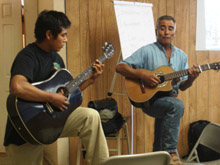
Father-and-son orange pickers Cesar Perez Tiburcio, left, and Cesar Perez Muños, wrote a song about the importance of wearing safety glasses. Below, Perez Muños discusses his work as a health promoter.
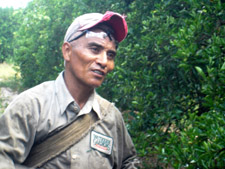
The workers themselves also come up with creative ways to reach their peers. For example, father and son Cesar Perez Muños and Cesar Perez Tiburcio, from Vera Cruz, Mexico, wrote a folk song about eye injuries. They played it at a recent meeting of the Community Advisory Council, the group of partners that works together to implement the training program. The song, which they sang in Spanish to a guitar is influenced by cumbia and corrido rhythms, educates workers about the importance of wearing glasses.
...I said to the promoter, 'Help me please,
my eye was struck by the branch of a tree.'
I tell you, friends, pay close attention.
You should use the lenses for your protection…
To evaluate the program, Dr. Monaghan and a team of researchers walk through the orange groves to count the number of workers wearing safety glasses. Each of the nine crews trained this year is checked six times, as are the four crews that served as control groups. Before the intervention, about 8% of workers were wearing the glasses. After the intervention began, use went up to 30%. The control group remained below 4% during the project.
Cesar Santes Valencia encourages workers to wear the glasses even if they are uncomfortable at first. "The first day, the workers complain it’s hard to get used to wearing the glasses," he said. "But if they try them for more than a day they get used to them. Some people start out using them a few hours a day and get used to them more and more. The glasses have helped him personally. "When I work without my glasses, I get stuff in my eye," he said. "When I have them on, I feel more confident working."
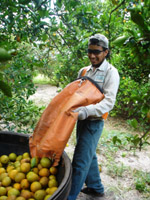
Citrus worker Martin Atzin unloads his latest load of oranges into a baño.
The best argument is showing the workers that the glasses don’t reduce the number of oranges that can be picked. Workers are paid by the baño, or tub full of oranges. A good picker can fill 10 to 15 of baños a day, which when full are 900 pounds. This year, health promoters were among the top pickers in all of Southern Gardens, according to USF researchers.
Health promoter Candido Lopez Garcia, who attended a Community Advisory Council meeting to speak with partners and other health promoters, said he has learned the argument that works. "I tell them, ‘Look, I can do it, I can pick the same amount of oranges. You can do it too."
- Page last reviewed: April 1, 2008
- Page last updated: April 1, 2008
- Content source: Division of Adult and Community Health, National Center for Chronic Disease Prevention and Health Promotion
Get email updates
To receive email updates about this site, enter your email address:
Contact Us:
- Prevention Research Centers
4770 Buford Hwy, NE
MS K-45
Atlanta, GA 30341-3717 - cdcinfo@cdc.gov

